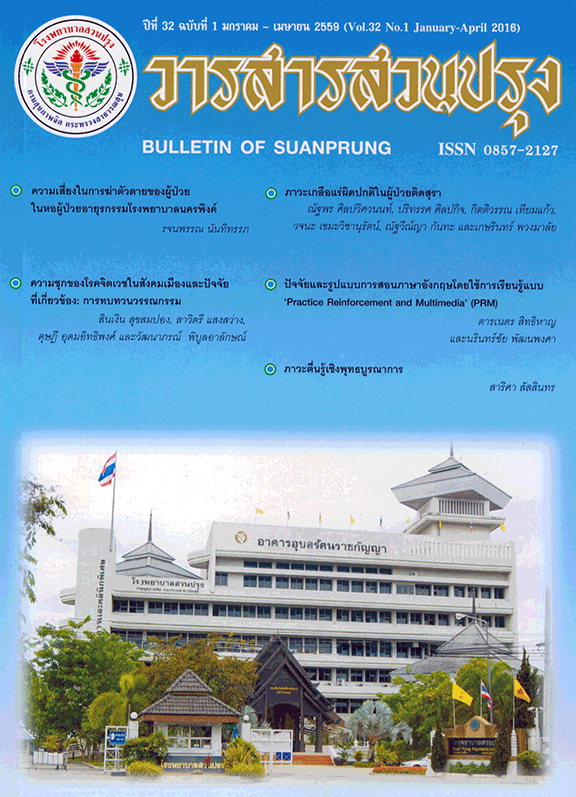ความชุกของโรคจิตเวชในสังคมเมืองและปัจจัยที่เกี่ยวข้อง : การทบทวนวรรณกรรม
Main Article Content
Abstract
ในสภาพสังคมที่บุคคลต้องมีการปรับตัวอยู่ตลอดเวลาทำให้เกิดผลกระทบต่อสุขภาพจิตของ คนในสังคมเป็นสาเหตุของการเกิดโรคทางจิตเวชได้ บุคลากรสาธารณสุขจำเป็นต้องมีความรู้และเข้าใจถึงความชุกและปัจจัยของการเกิดโรคจิตเวชเพื่อพัฒนาระบบบริการให้ดีขึ้น
การศึกษานี้เป็นการทบทวนวรรณกรรมที่เกี่ยวข้องกับการสำรวจความชุกและปัจจัยที่เกี่ยวข้องกับการเกิดโรคจิตเวชในสังคมเมืองของบางประเทศ เพื่อนำเสนอความชุกและปัจจัยที่อาจก่อให้เกิด โรคจิตเวชได้
ผลการศึกษาพบว่าความชุกของโรคทางจิตเวชที่พบบ่อยในสังคมเมือง คือ กลุ่มโรควิตกกังวล (Anxiety disorder), โรคทางอารมณ์ (Mood disorder), โรคจิตเวชเนื่องมาจากสารเสพติด (Substance abuse disorder) ตามลำดับ และในประเทศไทยพบความชุกของโรคจิตเวชร้อยละ 14.3 โดยพบ ความผิดปกติจากพฤติกรรมการดื่มสุรามากที่สุด รองลงมาคือโรคทางอารมณ์ โรควิตกกังวล และโรคจิตตามลำดับ
ปัจจัยที่เกี่ยวข้องกับการเกิดโรคได้แก่ ปัจจัยด้านความยากจน, การอพยพย้ายถิ่น, การใช้ สารเสพติด, ความหนาแน่นของประชากร, เพศ, อายุ และพัฒนาการตามวัย
สรุป
ความชุกโรคทางจิตเวชในกรุงเทพมหานครแตกต่างกับสังคมเมืองในประเทศอื่นๆ ซึ่งอาจเนื่องจากวัฒนธรรมและความเชื่อในการดำเนินชีวิตของคนไทย แต่ปัจจัยที่เกี่ยวข้องกับการเกิดโรคนั้นคล้ายคลึงกัน
Prevalence of Mental Disorders in Urban Area and Associated Factors: Review Article
In urban area where people have to be adapted over time, causing a negative impact on the mental health of people that is the cause of psychiatric disorders. Health personnel need to have knowledge and understanding of the factors and the prevalence of psychiatric disease for develop better health service system.
This study is a literature review exploring the prevalence and factors associated with mental disorders in some urban areas. This study aims to present the prevalent mental disorders and associated factors
The study found that the most prevalent of mental disorders were anxiety disorder, mood disorder and substance abuse disorder. For Thai, the study found that the prevalence of mental disorders is 14.3%. The most prevalence were substance abuse disorder, mood disorder, anxiety disorder and psychosis in order.
The factors associated with mental health disorders were poverty, migration, substance use, density of population, sex, age, and development according of age.
Conclusion
The prevalence of mental disorders in Bangkok difference to society in other countries. This may be due to cultural beliefs and lifestyle of the people in Thailand. The factors associated with the disease are similar.
Article Details
บทความหลังผ่านการปรับแก้จากกองบรรณาธิการแล้ว เป็นลิขสิทธ์ของวารสารจิตเวชวิทยาสาร โรงพยาบาลสวนปรุง กรมสุขภาพจิต กระทรวงสาธารณสุข ห้ามเผยแพร่เพื่อประโยชน์ทางการค้าโดยไม่ได้รับอนุญาต แต่อนุญาตให้เผยแพร่บทความดังกล่าวเพื่อประโยชน์ทางการศึกษาแก่ประชาชนทั่วไป ทั้งนี้กองบรรณาธิการไม่จำเป็นต้องเห็นด้วยกับบทความหรือข้อคิดเห็นใดๆ ที่ปรากฏในวารสารสวนปรุง

